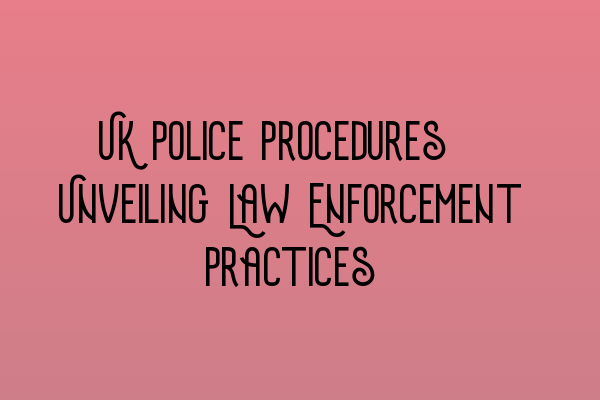UK Police Procedures: Unveiling Law Enforcement Practices
Welcome to SQE Criminal Law & Practice Law UK! In this blog post, we will delve into the intricacies of UK police procedures and shed light on the various practices followed by law enforcement agencies. Understanding these procedures is crucial for individuals involved in legal matters, aspiring solicitors, and anyone interested in the criminal justice system.
1. Arrest and Detention
One of the fundamental processes in UK police procedures is the arrest and detention of suspects. When a person is suspected of committing a crime, the police have the power to apprehend them and take them into custody for questioning.
Learn more about the rights of individuals during arrest and detention by reading our Legal Representation for Delaware LLCs in the UK: Expert Advice article.
2. Investigative Powers
Law enforcement agencies in the UK have various investigative powers to gather evidence and build a case against the accused. These powers include conducting searches, seizing property, and interviewing witnesses.
If you are interested in learning more about the challenges UK businesses face in the U.S. legal system, read our articles on Legal Challenges for UK Businesses in the U.S.: Strategies for Overcoming Hurdles and Legal Challenges for UK Businesses in the U.S.: Strategies for Overcoming Hurdles.
3. Questioning and Interviews
During the investigation, the police have the authority to question suspects and conduct interviews with witnesses. These interactions play a crucial role in collecting information and establishing facts.
If you are preparing for the SQE exam or aspiring to become a solicitor, check out our article on SQE Exam Prep: Essential Study Materials for Aspiring Solicitors to enhance your knowledge and improve your chances of success.
4. Arrest and Charging Decisions
Once the investigation is complete, the police make arrest and charging decisions based on the evidence gathered. These decisions are crucial as they determine whether a suspect will be prosecuted or released.
If you want to understand how expert testimonies can strengthen your case in UK courts, our article on Expert Testimonies in UK Courts: Building Strong Cases provides valuable insights and strategies.
5. Court Proceedings and Sentencing
After a suspect is charged, they will go through court proceedings where their case will be heard and a verdict will be reached. If found guilty, sentencing is determined based on the severity of the crime.
Stay tuned for future blog posts where we will discuss court procedures and sentencing guidelines in more detail.
We hope this overview of UK police procedures has provided you with valuable insights into law enforcement practices. If you have any questions or need legal assistance, feel free to reach out to SQE Criminal Law & Practice Law UK.
Disclaimer: This blog post is for informational purposes only and should not be construed as legal advice. Consult with a qualified solicitor for personalized assistance.
